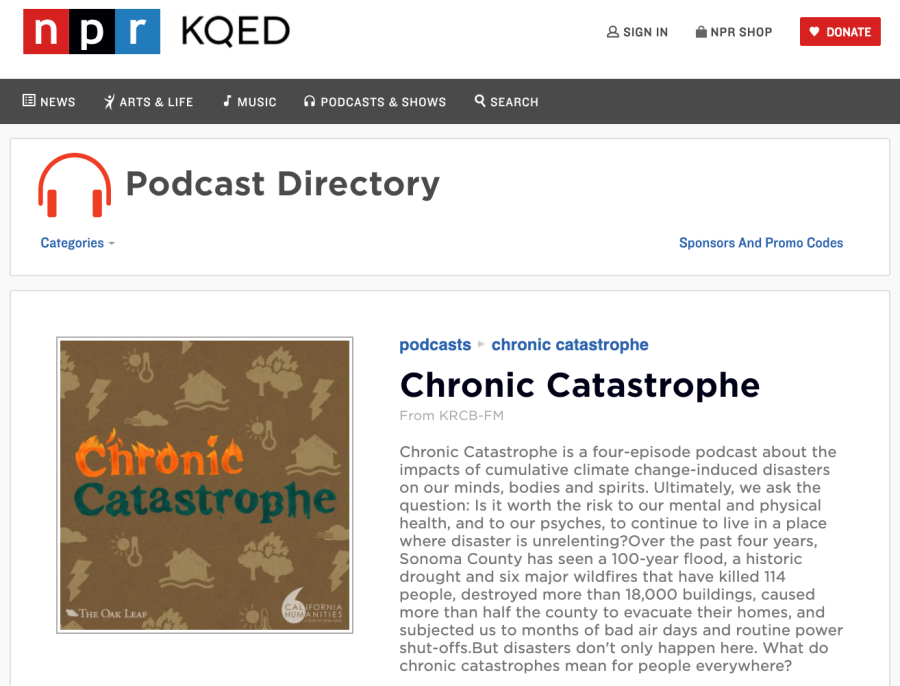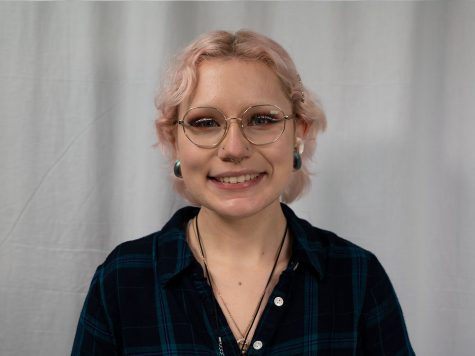NPR recognized the work of four Santa Rosa Junior College journalists by publishing their podcast “Chronic Catastrophe” to NPR.org Monday, making it The Oak Leaf’s first nationally syndicated podcast.
Current Oak Leaf editor Lauren Spates and photographer Nick Vides, in partnership with former Oak Leaf editor Maritza Camacho and reporter Rebecca Bell, were awarded a California Humanities fellowship grant as part of the Democracy and the Informed Citizen Emerging Journalist Fellowship Program. The group spent eight months putting together the four-part podcast on the effects of cumulative climate-induced calamities on our minds, bodies and spirits.
“I don’t think it’s hit me yet,” Vides said. “Lauren and I have been joking around with the idea that, ‘Wait, we’re national now? Our podcast? Wait, hell yeah it is, it deserves it!’”
The podcast was syndicated first by Northern California Public Media and is linked on NPR.org as a program by KCRB-FM, the radio counterpart to NCPM.
Reviews have been favorable, and the podcast has received five stars across the board on Apple Podcasts, with one user commenting under the pseudonym ToBe OrNot, “This podcast brings in the voices of people affected by the disasters of NorCal [Northern California] these past few years, and keeps me glued to my device.”
“I realized that listening to this is very affirming and validating, and helps motivate me to be more prepared, and more compassionate to everybody who’s affected,” they said.
The team interviewed more than 30 sources — from doctors and scientists to mental health experts and two members of Congress — via Zoom as the COVID-19 pandemic limited their ability to collaborate in person for a majority of the work.
“And the one time we did convene — to lay down our narration tracks — I unknowingly had COVID, so all the other hosts had to get tested,” Spates said of her breakthrough infection.
The team members hoped their podcast would open the eyes of people nation-wide to the impacts of chronic natural disasters that we can already see, and prepare themselves for what experts warned is to come.
“I want more people to feel what I felt when I wrote it: sadness and impatience and frustration and grief,” Spates said.
“I want listeners from places between California and New York to be emotionally affected by our work and to start fighting to get us out of this mess of our own making.”
The first three episodes focus on climate disaster risks to minds, bodies and spirits. Ultimately, the students ask whether, given the risks to minds, bodies and psyches, it’s worth it to live in a place — Sonoma County — with so many recurring disasters.
“One of the crazy things about living through these catastrophic incidents is honestly how surreal it feels,” Sonoma County Board of Supervisors Chair Lynda Hopkins said in the first episode, which followed Camacho as she explored whether PTSD can adequately reflect the trauma endured by Sonoma County residents living through repeated wildfires.
“You hear a siren, and it sends chills down your spine because you’re worried that that’s, you know, going to be a fire engine racing off to a blaze that could burn out of control and consume entire communities,” Hopkins said.
In addition to Sonoma County residents who shared their stories to make the podcast possible, the team extended their appreciation to their mentor and SRJC journalism program director Anne Belden.
“There have been many, many nights, sitting up with my now-2-year-old, when I questioned whether I could actually be a professional reporter,” Spates said, who returned to journalism after a 15-year career in sales and tech. “This podcast validated that with a legit mentor [in Anne], hard work and good sources, it’s possible.”
Check out the podcast and the trailer on NPR, Spotify or Apple Podcasts.




